- Home
- Introduction, Update Information, Links
- The Super Seventies "Classic 500"
- Readers' Favorite Seventies Albums
- Seventies Single Spotlight
- The Top 100 Seventies Singles
- Favorite Seventies Artists In The News
- Seventies Almanac - Year By Year
- Seventies Singles - Month By Month
- Seventies Albums - Month By Month
- Seventies Daily Music Chronicle
- Seventies Superstars In Their Own Words
- The Super Seventies Archives
- Seventies Trivia Quizzes & Games
- Seventies MIDI Jukebox
- The Super Seventies Bookstore
- The Super Seventies Photo Gallery
- Seventies' Greatest Album Covers
- Popular Seventies Movies & TV
- Seventies Celebrity Portrait Gallery
- Seventies Lyrics Hit Parade
- Top Seventies Artist Music Videos
- Seventies Usenet Music Forums
- Seventies Smiley Calendar
- EXTRA!
- Superseventies.com Facebook Page
- Superseventies.com Reddit Discussions
- The Super Seventies Blog
- Tweet The Seventies
- RockSite InfoBank
- Beatlefan Site
- Thanks For Your Support! / Top Sellers
- Search The Rock Site/ The Web
![]()
A new book details the heartbreaking rise and fall of the Bee Gees' little brother.
By Liz McNeil in People
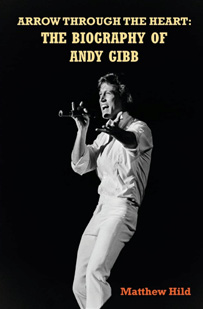
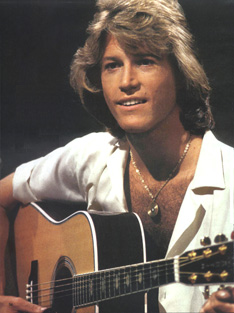
![]() n the mid-1980s, when he was performing sold-out shows to standing ovations in Las Vegas, Andy Gibb would often return to his dressing room feeling he had failed. "He had everything going for him," recalls his agent Jeff Witjas. "But I always felt that when he looked in the mirror, he saw nothing." Thirty-four years after Gibb's death from myocarditis at age 30, a new biography, Arrow Through The Heart
, sheds light on the singer's extraordinary rise to superstardom at 19 as well as on his persistent insecurities, struggles with fame and descent into cocaine addiction. No matter how many No. 1 singles he had (including "I Just Want to Be Your Everything"
and "Shadow Dancing"
) or how often older brother Barry told him he had "a better voice than any of them," says Arrow
author Matthew Hild, the youngest Gibb always felt lesser than the Bee Gee brothers he grew up idolizing. In the below book excerpts, Hild -- who interviewed close friends and musicians who knew Andy from the time he set out on a solo career playing bars in Ibiza and Australia -- looks back on the star's complicated life.
n the mid-1980s, when he was performing sold-out shows to standing ovations in Las Vegas, Andy Gibb would often return to his dressing room feeling he had failed. "He had everything going for him," recalls his agent Jeff Witjas. "But I always felt that when he looked in the mirror, he saw nothing." Thirty-four years after Gibb's death from myocarditis at age 30, a new biography, Arrow Through The Heart
, sheds light on the singer's extraordinary rise to superstardom at 19 as well as on his persistent insecurities, struggles with fame and descent into cocaine addiction. No matter how many No. 1 singles he had (including "I Just Want to Be Your Everything"
and "Shadow Dancing"
) or how often older brother Barry told him he had "a better voice than any of them," says Arrow
author Matthew Hild, the youngest Gibb always felt lesser than the Bee Gee brothers he grew up idolizing. In the below book excerpts, Hild -- who interviewed close friends and musicians who knew Andy from the time he set out on a solo career playing bars in Ibiza and Australia -- looks back on the star's complicated life.
![]() y June 1976, Barry and Bee Gees manager Robert Stigwood had decided Andy was ready to launch his career in the U.S. and Barry was ready to help him have some hits of his own. They went into a bedroom alone with their guitars to collaborate. Andy could only watch in astonishment as Barry wrote "I Just Want to Be Your Everything" in about twenty minutes. Before Andy even started recording the song, Barry had produced the backing tracks. "I Just Want to Be Your Everything" spent for weeks at number one on the Billboard
Hot 100 that summer and sixteen weeks in the top ten.
y June 1976, Barry and Bee Gees manager Robert Stigwood had decided Andy was ready to launch his career in the U.S. and Barry was ready to help him have some hits of his own. They went into a bedroom alone with their guitars to collaborate. Andy could only watch in astonishment as Barry wrote "I Just Want to Be Your Everything" in about twenty minutes. Before Andy even started recording the song, Barry had produced the backing tracks. "I Just Want to Be Your Everything" spent for weeks at number one on the Billboard
Hot 100 that summer and sixteen weeks in the top ten.
Barry wrote or co-wrote smash hits for Andy, while Andy's own songs were relegated to albums and B-sides by Andy's manager and Barry. "I don't have any say in anything," Andy told his personal assistant Tony Messina.
As Andy's fame grew, his personal fame was imploding. His 1976 marriage to Kim Reeder had ended within a year. Kim was suing him for support and was about to give birth, but it would be difficult for Andy to see his child in Australia with the constant demands that had come with his rapid rise to superstar status.
And as his success continued -- his second album, Shadow Dancing , sold more than a million copies -- his cocaine use was growing out of control.
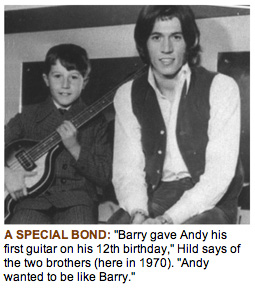 In March 1978, Andy fell asleep during a live radio interview and collapsed at a photo shoot. Weeks later, when a journalist went to meet Andy in L.A., the publicist told him Andy was in the hospital. Andy had done "a little too much coke, and he's got a heart murmur."
In March 1978, Andy fell asleep during a live radio interview and collapsed at a photo shoot. Weeks later, when a journalist went to meet Andy in L.A., the publicist told him Andy was in the hospital. Andy had done "a little too much coke, and he's got a heart murmur."
By 1979 Andy and Barry began working on his third album, but Andy was missing rehearsals.
Andy later admitted that his cocaine problem had been the cause: "I started not turning up for recording sessions." The first single, "Desire," was an unreleased Bee Gees recording with a new lead vocal overdubbed by Andy.
In January 1980 Andy's ex-wife Kim, who hadn't heard from him in two years, flew to L.A. with their 2-year-old daughter Peta.
Andy greeted her with "Hello Kim, how much money do you want?" Kim would recall than when she told him she merely wanted him to meet his daughter, he replied, "I don't know if I can cope with that." Nevertheless, he told Kim to meet him at his hotel. Kim later said that she was shocked by Andy's appearance. "He was clearly not well."
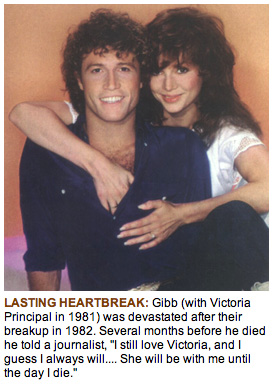 In 1981 Andy fell hard for
Dallas actress Victoria Principal. The affair electrified the press.
In 1981 Andy fell hard for
Dallas actress Victoria Principal. The affair electrified the press.
The relationship carried a whiff of scandal for many observers, since Victoria was still not legally divorced and was at least eight years older than Andy. She told a reporter, "I didn't check his I.D."
At the same time his career seemed to be stagnating. Andy Gibb's Greatest Hits reached only number forty-six on the Billboard chart.
His relationship with Victoria became increasingly rocky. At the People's Choice Awards in 1982, they started arguing, albeit quietly. Afterwards, Andy told a journalist, "When we got back to the house, we just started ranting and screaming and pushing and shoving. I stormed out and drove back to my house in Malibu. That was the last time I saw Victoria." Later he admitted, "I just fell apart.... I started to do cocaine around the clock -- about $1,000 a day. I stayed awake for two weeks and locked in my bedroom.... I wanted to commit suicide." He spent three days at a hospital, where he was registered under the pseudonym "Roy Lipton," being treated for what his father called "a nervous breakdown."
Afterwards, the decline of his record sales during 1980-81 and, especially, his reputation for cocaine abuse and unreliability meant that record companies weren't knocking on his door.
In 1982, Andy joined a production of the play "Something's Afoot" in Toronto. He admitted to castmate Lenore Zann, whom he dated, that "it had been extremely painful for him growing up in the shadow of his brothers," she recalled. "He wanted to be a fourth Bee Gee. No matter how famous he got on his own, he would never be good enough."
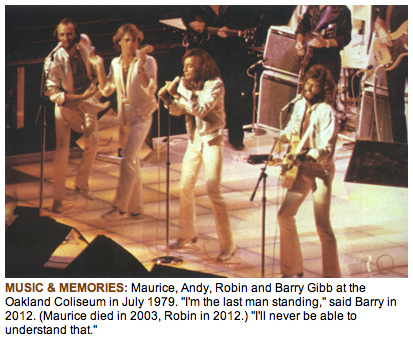 He began working the casino circuit in Vegas and Atlantic City. But his emergency-room visits -- for chest and stomach pains and an erratic heartbeat -- became more frequent. After pleading from his parents, Andy entered Betty Ford in April 1985 -- and stayed for six weeks.
He began working the casino circuit in Vegas and Atlantic City. But his emergency-room visits -- for chest and stomach pains and an erratic heartbeat -- became more frequent. After pleading from his parents, Andy entered Betty Ford in April 1985 -- and stayed for six weeks.
His family felt relieved. Maurice had his own battle with alcoholism. He had gently tried to get Andy to confront his own addictions, but to no avail.
Once out of rehab, Andy met his manager Marc Gurvitz and musician Joey Carbone for lunch, hoping to revive his career.
Joey recalled the occasion years later: "Andy orders a beer. Marc says, 'What the f---- are you doing, man, you just got out of rehab!' And Andy was like, 'Oh, it's alright, just one beer, mate.'" Andy "kept on going to the bathroom..." presumably to do cocaine. Said Joey: "We never got together after that."
By 1986 Andy was playing supper clubs like the San Francisco Fairmont before a fraction of the crowds he'd once sung to.
Film critic Mick LaSalle went to see him. "Gibb's show was a pathetic spectacle. His confidence was gone. At one point, he said, 'The last time I was in the Bay Area, I played the Oakland Coliseum.'" LaSalle began to anticipate telling his readers "that if they wanted to see a teen idol fall apart before their eyes, this was the show."
He never wrote the column. "This was a young man, who was barely holding it together. I didn't want to be the person that made him come apart."
Andy's brothers urged him to move back to Miami, where Barry and Maurice lived. He filed for bankruptcy in 1987, and his brothers gave him a $200 weekly allowance. Now clean and sober, Andy began recording for the first time in years.
On Jan. 27, 1988, he flew to London to live in the cottage on Robin's property.
Robin took Andy to the London headquarters of Island Records to meet with the company's founder and president, Chris Blackwell, and sign a contract. Robin told Blackwell that the Bee Gees would bring Andy along as an opening act on their upcoming world tour.
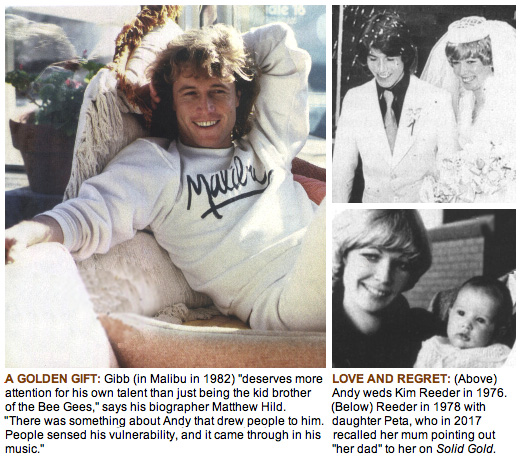 "He was happy and full of bounce at first," said Terry Connor, a family friend. "He seemed like a new man, looking forward to working again. He certainly was not doing cocaine anymore." Andy did start showing up, alone, some nights at two nearby pubs, but according to witnesses he never had more than one or two drinks. But he soon appeared to be troubled. He began sitting outside St. Marys Church, across the street from Robin's estate, during the morning. The nuns invited Andy inside and served him tea and fed him.
"He was happy and full of bounce at first," said Terry Connor, a family friend. "He seemed like a new man, looking forward to working again. He certainly was not doing cocaine anymore." Andy did start showing up, alone, some nights at two nearby pubs, but according to witnesses he never had more than one or two drinks. But he soon appeared to be troubled. He began sitting outside St. Marys Church, across the street from Robin's estate, during the morning. The nuns invited Andy inside and served him tea and fed him.
His chronic insecurity came back in full force once it was time for him to start writing and recording again. Andy began missing appointments.
On Feb. 29 he went to the hospital suffering severe chest pains. He checked himself out before doctors could do any tests.
Andy neglected to tell any of the staff that cardiologists in California had diagnosed him with pericarditis, a swelling of the tissue around the heart.
On March 7, he went back into the hospital. Before Andy left Robin's estate that evening, Robin had a brief conversation with him. "I said, 'Andy, if you keep up what you're doing, you will not see forty-seven.' I don't know why I said forty-seven... but I said it." Andy once again left the hospital without staying overnight. Then on the evening of March 9, he collapsed.
An ambulance rushed Andy, accompanied by his mother, back to the hospital. A year later she recalled that his final words to her were, "You can't die from this, can you?"
Andy died early the next morning, at the age of 30. The official cause of death was myocarditis, an inflammation of the heart muscle that can be exacerbated by drug abuse.
Andy's father saw to it that Kim and Peta learned of Andy's death before they could hear about it from the press, and they flew to London, where the family held a private service.
Andy had phoned Kim in January, asking if Peta could come to England. He had only met Peta once. Kim told Andy that wouldn't be possible, so he said he would come to Australia in September.
Andy was buried in L.A. on March 21. At the conclusion of the funeral, Maurice felt overwhelmed. "The loneliest feeling," he later recalled, "was when his coffin was left outside before the burial... I felt like he'd been abandoned. And we all wanted to go back and just stay with him."
In a way, Andy posthumously achieved his wish to become the fourth Bee Gee. On November 14, 1997, at the MGM Grand in Las Vegas, the Bee Gees gave a concert "One Night Only" and performed "(Our Love) Don't Throw It All Away" (Andy's fifth consecutive top ten single), while footage of Andy was shown on the big screen behind them. At one point, the three brothers stopped singing, except for backing vocals, while Andy's lead vocal from his recording of the song played.
![]() Reader's Comments
Reader's Comments
No comments so far, be the first to comment .
![]() Best of EXTRA!
| EXTRA!
| Main Page
| Seventies Single Spotlight
| Search The RockSite/The Web
Best of EXTRA!
| EXTRA!
| Main Page
| Seventies Single Spotlight
| Search The RockSite/The Web


